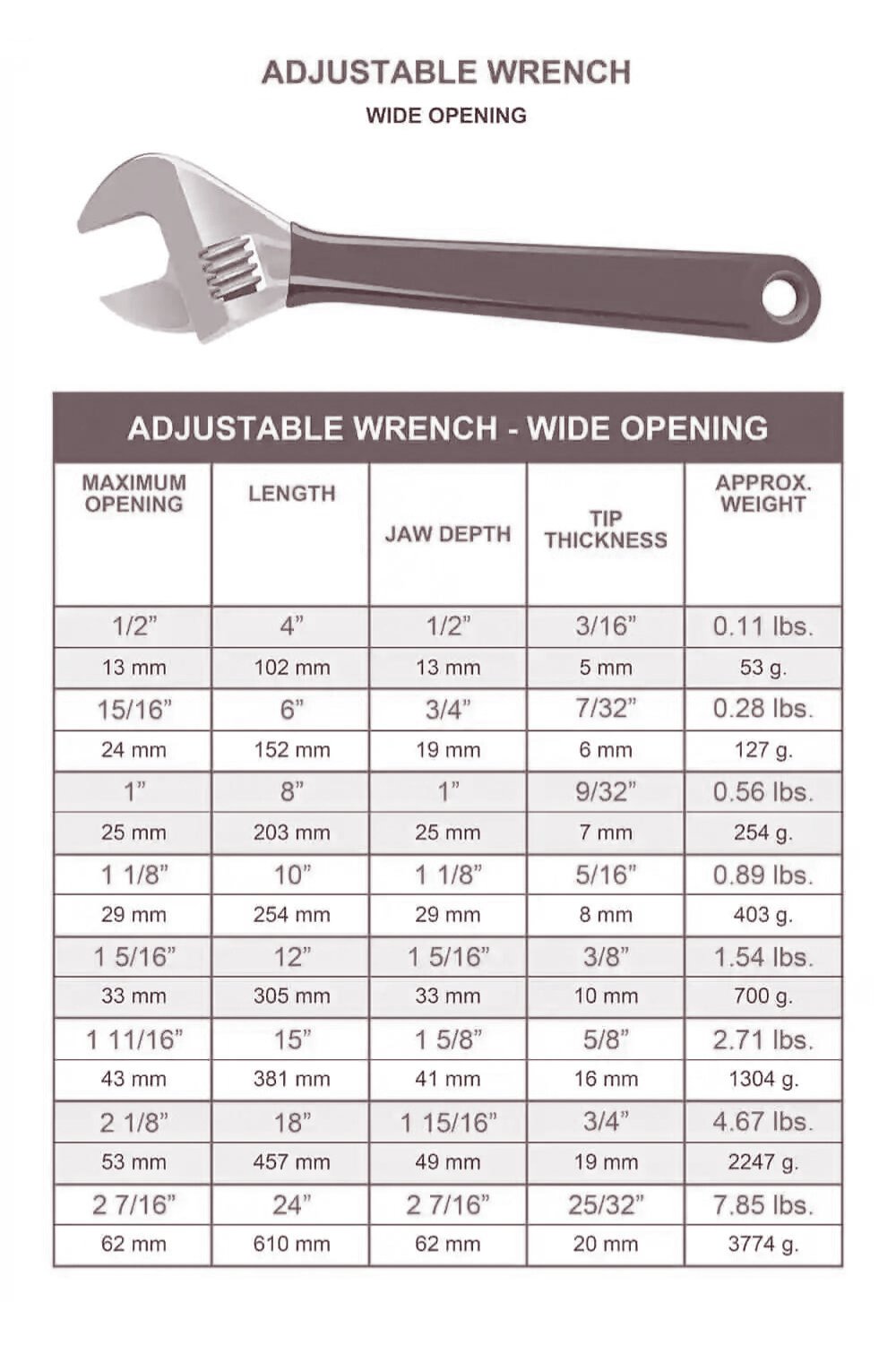
Can a wrench handle different nut sizes? That’s a question that many people have when it comes to tackling various projects around the house or in the garage. Well, get ready for some wrenching knowledge because we’re about to dive into this topic!
You see, when it comes to wrenches, they come in different sizes and shapes to match the specific nuts or bolts you’re working with. It’s like having a toolbox full of options, each one designed to handle a different task.
But here’s the exciting part: some wrenches are actually adjustable! Yes, you heard that right. These magical tools can adapt to different nut sizes, making them incredibly versatile and handy to have around. So, let’s dig deeper and explore how these adjustable wrenches work and how they can save the day in various situations.

Can a Wrench Handle Different Nut Sizes?
When it comes to using a wrench, one common question that often arises is whether a wrench can handle different nut sizes. The answer to this question depends on various factors, including the type of wrench and the range of sizes it is designed to accommodate. In this article, we will explore different types of wrenches and their versatility in handling various nut sizes. Whether you are a DIY enthusiast or a professional mechanic, understanding the capabilities of different wrenches can help you choose the right tool for the job.
Types of Wrenches for Different Nut Sizes
1. Adjustable Wrench
2. Combination Wrench
3. Socket Wrench
1. Adjustable Wrench
An adjustable wrench, also known as a crescent wrench, is designed to handle a range of different nut sizes. It features an adjustable jaw that can be tightened or loosened to fit various sizes of nuts. The wrench typically has a measurement scale on the jaw, allowing you to select the appropriate size. While adjustable wrenches offer versatility, they may not provide the same level of grip and precision as dedicated wrenches for specific sizes.
One key advantage of an adjustable wrench is its ability to handle both metric and standard (imperial) nut sizes. This makes it a handy tool for tackling different types of projects. However, it is important to note that adjustable wrenches are not suitable for high-torque applications, as they may slip or round off the edges of the nut.
Overall, an adjustable wrench is a versatile tool that can handle different nut sizes to a certain extent. It is useful for general purposes and emergencies but may not be the best option for specialized tasks that require high precision and torque.
2. Combination Wrench
A combination wrench is a double-ended tool that features a closed-end wrench on one side and an open-end wrench on the other. The closed-end wrench is designed for specific nut sizes, while the open-end wrench can handle a range of sizes. Combination wrenches are available in both metric and standard sizes, making them suitable for various applications.
Unlike adjustable wrenches, combination wrenches provide a more secure grip and better torque transfer, thanks to their dedicated design for specific nut sizes. This ensures a higher level of precision and reduces the risk of slipping or rounding off the nut edges. By using the closed-end side of the combination wrench, you can achieve even better grip and torque compared to the open-end side.
Combination wrenches are commonly used in automotive repair and maintenance, as well as in other industries where precise and reliable fastening is necessary. They are an excellent choice for projects that involve specific nut sizes and require a greater level of control and torque.
3. Socket Wrench
A socket wrench, also known as a ratchet wrench, is a versatile tool that can handle a wide range of nut sizes. It consists of a ratcheting mechanism and a set of interchangeable sockets. The sockets come in various sizes and can be easily attached or detached from the wrench.
Socket wrenches are highly versatile and allow for quick and easy adjustments between different nut sizes. They are available in both metric and standard sizes, catering to the needs of various industries and applications. The ratcheting mechanism enables continuous rotation in one direction, making it efficient for repetitive tasks.
Socket wrenches provide excellent torque transfer and precision, ensuring a secure grip on the nut. They are widely used in automotive repairs, construction, and other industries that require fast and efficient fastening. However, it is important to select the appropriate socket size to ensure a proper fit and prevent slipping or damaging the nut.
Benefits of Using the Right Wrench for Different Nut Sizes
1. Enhanced Efficiency
Using the right wrench for different nut sizes improves your efficiency and saves valuable time. With a dedicated wrench for a specific size or a versatile wrench that can handle a range of sizes, you can quickly and easily tighten or loosen nuts without the hassle of constantly switching tools or adjusting jaws. This increased efficiency is particularly valuable in time-sensitive projects or situations.
2. Improved Precision
Using the right wrench ensures a secure grip on the nut, reducing the risk of slipping or rounding off the edges. This enhanced precision not only prevents damage to the nut but also ensures a proper and reliable fastening. Whether you are working on delicate equipment or heavy machinery, using the appropriate wrench helps maintain the integrity of the fasteners and adds to the overall safety and reliability of the project.
3. Minimized Wear and Tear
Using a wrench that is designed for the specific nut size minimizes wear and tear on both the wrench and the nut. When a wrench properly fits the nut, the force is distributed evenly, reducing the likelihood of damaging the nut or the wrench itself. This longevity and durability of both the wrench and the nut result in cost savings over time, as you won’t need to replace worn-out tools or damaged fasteners as frequently.
Key Takeaways: Can A Wrench Handle Different Nut Sizes?
- A wrench is a versatile tool that can handle different nut sizes.
- Most wrenches have an adjustable mechanism that allows them to fit various nuts.
- It is important to choose the right size wrench for the nut you are working with.
- Using the wrong size wrench can result in damage to the nut or the wrench itself.
- Always check the size markings on the wrench and match them with the nut before using.
Frequently Asked Questions
When it comes to working with nuts, having the right tools is essential. Can a wrench handle different nut sizes? Let’s find out.
1. How do I know if a wrench can handle different nut sizes?
A wrench is designed to fit specific nut sizes. Look for a wrench labeled as adjustable or multi-size. These types of wrenches have jaws that can be adjusted to fit different nut sizes. Additionally, you can check for a wrench with a wide opening and a movable jaw mechanism, allowing it to accommodate various sizes.
Another option is a wrench set that includes multiple wrenches, each designed to handle a specific range of nut sizes. This provides versatility, ensuring you have the right tool for different tasks.
2. Can I use the same wrench for all nut sizes?
While some adjustable wrenches can handle a range of nut sizes, it’s generally recommended to use the right size wrench for the job. Using an appropriately sized wrench ensures a secure grip on the nut, minimizing the risk of slipping or damaging the nut or the wrench.
Using the correct size wrench also helps distribute the turning force evenly, reducing the likelihood of rounding off the nut or damaging the fastener. Investing in a set of wrenches or an adjustable wrench that covers a range of sizes will provide you with the right tool for the job.
3. What are the benefits of using an adjustable wrench?
An adjustable wrench offers versatility by allowing you to handle different nut sizes with a single tool. This eliminates the need to carry around multiple wrenches or constantly switch between different tools during a project.
Adjustable wrenches are also convenient for situations where you don’t have access to a complete set of wrenches or when you’re working with nuts of unknown sizes. They provide flexibility and adaptability, making them a valuable addition to any toolbox.
4. Are there any limitations when using an adjustable wrench?
While adjustable wrenches are versatile, they do have their limitations. They may not provide the same precise fit as a wrench specifically designed for a particular nut size. This can result in a less secure grip, increasing the risk of the wrench slipping or damaging the nut.
Additionally, because adjustable wrenches are adjustable, there is a potential for the jaws to open wider over time with repeated use. This can lead to a less precise fit and a decreased ability to handle smaller nut sizes. Regular maintenance and inspection of the wrench are important to ensure it remains in good working condition.
5. Can a wrench be used for other tasks besides nuts?
A wrench is a versatile tool that can be used for various tasks beyond nuts. It is commonly used for turning bolts, removing or tightening fasteners, and adjusting plumbing fixtures. However, it’s important to ensure you have the right size and type of wrench for the specific task to avoid damaging the wrench or the object you’re working on.
Always refer to the manufacturer’s guidelines or seek professional advice if you’re unsure about the appropriate use of a wrench for a specific task. Safety should always be a top priority when working with tools.
Summary
So, can a wrench handle different nut sizes? The answer is yes! A wrench with an adjustable jaw can be used to tighten or loosen nuts of various sizes. Just slide the jaw to fit the nut, and you’re good to go!
But remember, not all wrenches are adjustable. Some wrenches have a fixed size and can only be used on nuts that match their size. So, if you need a versatile tool that can handle different nut sizes, make sure to get an adjustable wrench. It’ll save you time and effort in your DIY projects or repairs around the house.

